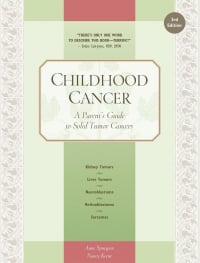Childhood Cancer
Ceremonies
Some families enjoy having ceremonies to celebrate the end of cancer treatment. For younger children who have spent much of their lives taking pills and having procedures, ceremonies really help them grasp that treatment is truly over. Here are ideas from many families about how to commemorate this important occasion:
• Take “last day of treatment” pictures of the hospital and staff
• Take a picture of your child taking her last pill
• Give trophies to your child and siblings
• Ask the clinic to present your child with a certificate
• Go on a trip or vacation to celebrate
• Throw a big party for friends and family
Erica ended treatment in December, and we threw a big party at the church. We called it a “Celebration of Life.” We invited all of the families that we had become so close to through the support group. We especially wanted the families who had lost their children to cancer, and they all came. My normally even-tempered husband gave a talk about Club Goodtimes (the support group) and how it was a club that no one ever wanted to join. When he talked about the many wonderful people we met there, his voice shook with emotion. Then the preacher prayed for the children who weren’t with us. We ate a huge cake, and the children were entertained by a clown. It was both moving and fun.
• Throw a big party at school.
Joseph finished treatment when he was in kindergarten. The kids had gone through almost an entire year with him. They had known all about his treatments and frequent hospitalizations and had talked as a group about it when we made a presentation to the class, and at other times as well. It seemed appropriate to have an “all done with treatment” celebration. We even had his two best friends who go to different schools come over to join us; and his big brother, Nate, came down from his class to share in the fun.
It was a very joyous occasion, and we made it as much like a birthday party as we could. I brought cupcakes and juice and we played games. A friend who leads the story hour at our children’s bookstore came and did some songs and stories with the kids; and I even sent each classmate home with a treat bag. At the end, right before time to go home, Joseph pulled out several cans of his favorite hospital discovery, and the kids took turns blasting a shower of Silly String® on everyone else! We all clapped and cheered, and Joseph’s wonderful teacher and I had a chance to have a good celebratory cry while the kids put on their things to go home. Clean-up wasn’t too darn bad, and it meant a lot to all of us.
There’s still a tiny remnant of green Silly String® on one of the fluorescent light fixtures, and my big second-grader likes to go down and admire it when he visits his old kindergarten teacher.
• If your child has been seeing a counselor, schedule a visit to talk about the accomplishment.
• Have friends and family send congratulations cards.
• If consistent with your beliefs, have a religious ceremony of thanksgiving.
I preached the sermon at church after Kristin ended treatment. It was the first Sunday of Lent, and I related our experience to that. Other than that, we didn’t celebrate, because it’s still not over. We still have to be vigilant. Ending treatment was a big milestone, but it paled in comparison to having the line pulled. We all have so much more freedom: no more lines to flush, changing bandages, or wrapping up for baths and swimming.
• Some parents do not feel comfortable celebrating the end of treatment. One mother described her feelings this way:
Finishing treatment was very difficult. I thought that I would feel like celebrating and cheering—but all I felt was fear. Treatment was over, but cancer was still a part of our lives. I think we will always live with the fear of relapse. It has taken me some time to come to grips with that reality.
As you have read so often in this book, every child, brother, sister, parent, and relative reacts differently to treatment—and to the end of treatment. The differences do not matter. What is important is that you feel free to express your feelings, whatever they may be. You may feel joyful, relieved, fearful, or terrified, but the end of treatment is emotionally charged for every member of the family.
Table of Contents
All Guides- Introduction
- 1. Diagnosis
- 2. Bone Sarcomas
- 3. Liver Cancers
- 4. Neuroblastoma
- 5. Retinoblastoma
- 6. Soft Tissue Sarcomas
- 7. Kidney Tumors
- 8. Telling Your Child and Others
- 9. Choosing a Treatment
- 10. Coping with Procedures
- 11. Forming a Partnership with the Medical Team
- 12. Hospitalization
- 13. Venous Catheters
- 14. Surgery
- 15. Chemotherapy
- 16. Common Side Effects of Treatment
- 17. Radiation Therapy
- 18. Stem Cell Transplantation
- 19. Siblings
- 20. Family and Friends
- 21. Communication and Behavior
- 22. School
- 23. Sources of Support
- 24. Nutrition
- 25. Medical and Financial Record-keeping
- 26. End of Treatment and Beyond
- 27. Recurrence
- 28. Death and Bereavement
- Appendix A. Blood Tests and What They Mean
- Appendix B. Resource Organizations
- Appendix C. Books, Websites, and Support Groups

